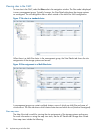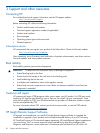site A user-designated location in which storage systems are installed. Multi-Site SAN configurations
have multiple sites with storage systems in each site, and each site has its own subnet. A site can
be a logical configuration, such as a subnet within the same data center, department, or
application.
SmartClone
volume
SmartClone volumes are space-efficient copies of existing volumes or snapshots. They appear as
multiple volumes that share a common snapshot, called a clone point. They share this snapshot
data on the SAN.
snapshot set Application-managed snapshots created for a volume set.
snapshot A fixed version of a volume for use with backup and other applications.
SNMP traps Use traps to have an SNMP tool send alerts when a monitoring threshold is reached.
solution pack HP StoreVirtual Application Integration Solution Pack
split mirror A full copy of data that has been split off from the original and is no longer being updated.
standard cluster Also known as a “cluster.” A standard cluster is one that does not use any of the Multi-Site features
within the LeftHand OS software. Standard clusters:
• Cannot contain storage systems that are designated to reside in a site.
• Cannot contain storage systems that span subnets.
• Can only have a single VIP.
storage server Storage server software maintains the customer's data. It reads to and writes from disks in response
to customer reads and writes of LeftHand OS volumes.
stripe Striped data is stored across all disks in the array, which increases performance but does not
provide fault tolerance.
synchronize The process of copying the most recent snapshot from the primary volume to a new remote
snapshot. On failback, synchronization is the process of copying the most recent remote snapshot
back to the primary volume. The CMC displays the progress of this synchronization. Also, you
can manually synchronize if necessary to include data that is on the remote volume but not the
primary.
target secret Target secret is used in both 1-way and 2-way CHAP when the target (volume) challenges the
iSCSI initiator.
temporary space Temporary space is created when a snapshot is mounted for use by applications and operating
systems that need to write to the snapshot when they access it. Temporary space can be converted
to a volume using the SmartClone process.
thin provisioning Thin provisioning reserves less space on the SAN than is presented to application servers.
trap A type of SNMP message used to signal that an event has occurred. (SNIA)
Trap Community
String
The Trap Community String is used for client-side authentication when using SNMP.
unicast Communication between a single sender and a single receiver over a network.
VIP virtual IP address
virtual IP address A highly available address that ensures that if a storage system in a cluster becomes unavailable,
servers can still access the volume through the other storage systems in the cluster.
virtual machine A virtual storage appliance that provides one or more simultaneous storage environments in which
LeftHand OS may execute as though they were running on the bare iron.
virtual manager A manager that is added to a management group but is not started on a storage system until it
is needed to regain quorum.
volume A logical entity that is made up of storage on one or more storage systems. It can be used as
raw data storage or it can be formatted with a file system and used by a host or file server.
volume lists For release 7.0 and earlier, provide the link between designated volumes and the authentication
groups that can access those volumes. Not used in release 8.0 and later.
volume set Two or more volumes used by an application. For example, you may set up Exchange to use two
volumes to support a StorageGroup: one for mailbox data and one for logs. Those two volumes
make a volume set.
37


















